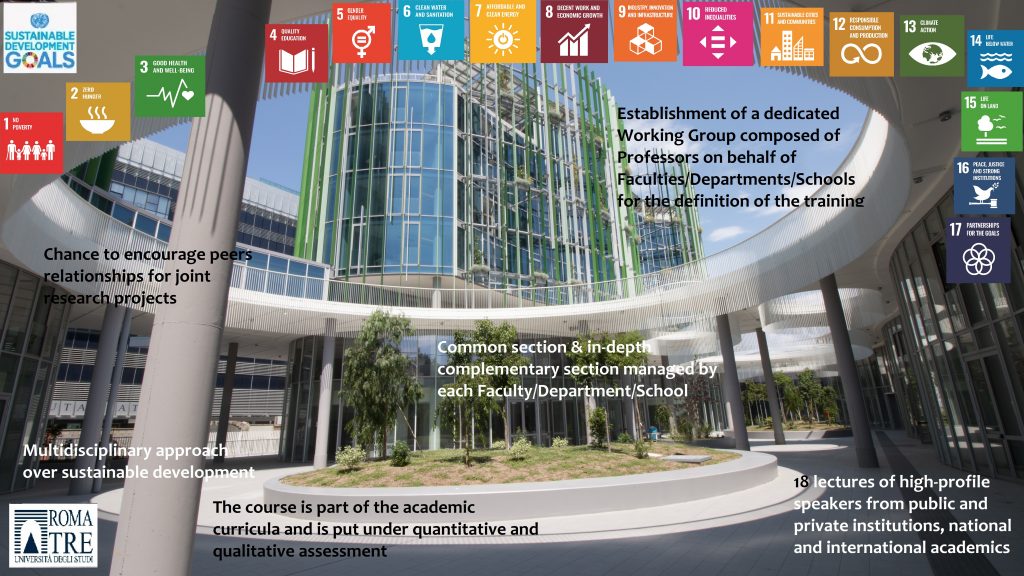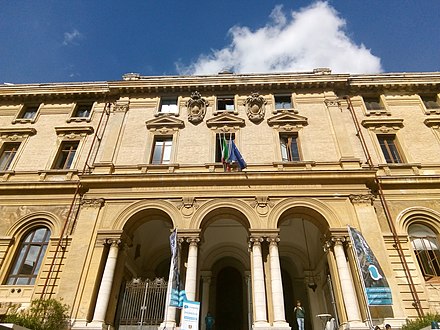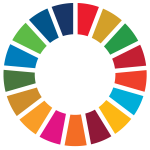Esta web utiliza cookies para que podamos ofrecerte la mejor experiencia de usuario posible. La información de las cookies se almacena en tu navegador y realiza funciones tales como reconocerte cuando vuelves a nuestra web o ayudar a nuestro equipo a comprender qué secciones de la web encuentras más interesantes y útiles.
The 2030 Agenda for Sustainable Development under Inter- & Multi-Disciplinary Lens
Description
Institution
Roma Tre University - Department of Political Science

Organizations/areas of the university involved
All Faculties/Departments/Schools of Roma Tre University
Country
italy
Roma Tre University has set up a multidisciplinary course for all students on UN 2030 Agenda for Sustainable Development to provide high-level training to shape a more sustainable future.
The 2030 Agenda for Sustainable Development is an ambitious global framework launched in 2015 within the UN system, which has become increasingly relevant today. The challenge of the 2030 Agenda is to adopt a multi-disciplinary approach over sustainable development: not only the physical and technological dimensions of sustainability, aimed at reducing emissions, combating climate change and ensuring environmental protection rules, but also aspects relating to economy, society , justice, culture, social cohesion, and the fight against hunger, poverty and inequality. The training proposed by Roma Tre University to all its students is divided into a common, multidisciplinary section and an in-depth and complementary section managed by the various Faculties / Departments / Schools. The common part consists of 18 lectures: an introductory one and others dedicated to the 17 SDGs. These lectures are entrusted to high-profile speakers from the public and private institutions as well as from the national and international academia. Attendance to these lectures is supplemented by an e-learning module on the 2030 Agenda offered by ASVIS (Italian Alliance for Sustainable Development).
Results and impact measured or expected
The outcome of this training course has been yet granted by the official recording of an high number of participants among students from all Faculties / Departments / Schools of Roma Tre University involved (more than 500), thanks to the remote format of the lectures due to containment rules depending on the health emergency in Italy. Also the involvement of speakers at the academic level and beyond academia has encouraged a cross-cutting and dynamic interaction with students from very different but complementary paths. Quantitative and qualitative assessment about the outcome of the training is yet in place and the success of this proposal resides upon: the large involvement of all students of Roma Tre University, the high reaction during the lectures in the dedicated Q&A session with significant and targeted questions posed to the speakers,
Connection with the SDG framework
The training course covers all basic requirements for students, according to their academic path, proper skills, knowledge and mindsets. Indeed the multidisciplinary approach entails a cross-cutting vision for students attending all lectures and submitting a final paper to confirm their increased awareness and critical thinking about the 2030 Agenda for Sustainable Development, their learning skills in face of different topics to be linked to professional opportunities in their future carriers, their ethical reflections over the challenges of sustainable development at large, and their curiosity towards key global issues related to SDGs. The training also offers an interdisciplinary vision, encompassing both conceptual and practical perspectives; participation of relevant speakers from national and European institutions as well as from the private sector and the academia confirms the multi-actor involvement requirement of the EforSDGs framework. Finally the training course has been integrated into existing curricula in the several Faculties/Departments/Schools of Roma Tre University.
Barriers and follow up
The conceptualization of the training course was not an easy task at the very early stage, due to different knowledge paths for students from all Faculties/Departments/Schools of Roma Tre University and to divergent assessment mechanisms. At the same time the need to articulated the training course to satisfy general information needs on the 2030 Agenda for Sustainable Development and in-depth data for each SDGs has been another critical point. The creation of a dedicated Working Group at Roma Tre University, composed of Professors on behalf of Faculties/Departments/Schools involved in the definition of the training offer has represented an unique opportunity to debate over these two key points to overcome criticalities, especially through the pre-identification of relevant speakers for the lectures as well as for the chance to prepare and share in advance all useful basic and detailed materials for the benefit of students attending the training course.
Transferability of the initiative
The training course, due to the success of the first edition, will be proposed again in the next academic year of Roma Tre University 2021-2022, also taking into consideration any possible scale-up of the model. With a due interdisciplinary approach and a dedicated availability of Professors in charge for the topic in other University, the initiative could be easily replicated.
Education 4 SDG funciona gracias a WordPress


